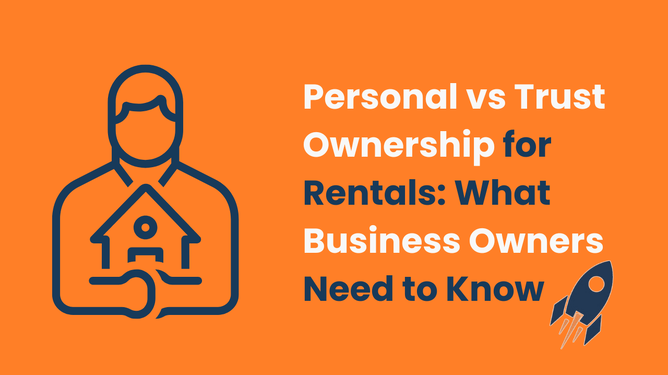When you buy a rental property, the structure you choose matters. It is not just about tax, it is about risk, protection, and long-term planning. Many business owners overlook this and simply default to personal ownership, without realising the consequences.
Personal Ownership
Purchasing the rental in your own names is straightforward and low cost. It may be the same as how you own your home or company shares. There is little administration involved, and you prevent the set-up costs and ongoing compliance costs of a Trust.
The downside is exposure. If you are running a business, particularly in industries like construction, finance, or professional services, you carry a level of business risk. If something goes wrong, personal assets such as rental properties (or your own home) can be vulnerable.
Here are some examples of what “going wrong” can look like:
A customer takes legal action over a disputed job and your company is sued.
A major client does not pay their bills, leaving your company unable to meet its own obligations.
An accident on site leads to unexpected claims or penalties.
A downturn in the market pushes your company into financial stress and creditors come knocking.
In each of these situations, if you own property personally, it is part of the assets that creditors or claimants can pursue.
Trust Ownership
Buying through a trust requires setup and ongoing administration, but it creates separation. A Trust can act as a shield between your personal wealth and your business risks. If your company faces a dispute or debt claim, assets in a properly managed Trust are generally much harder to reach.
For the shield to be effective, the trust must be administered correctly. This includes keeping trust affairs separate from personal affairs, holding regular trustee meetings, and documenting decisions through resolutions.
For example: A client in a construction business bought their first rental in personal names. A few years later, their company became involved in a legal dispute. While they were able to manage through it, the experience was a wake-up call. They realised that had they placed the property into a Trust at the outset, it would have been far better protected.
The Trade-off
While asset protection is the main goal, there are some tax differences between the options.
The trust tax rate is 39% for income that is not distributed to beneficiaries. For individuals earning less than $180,000, their personal marginal tax rate is lower than 39%. Consequently, accumulating profits within the trust can be less tax-efficient than earning the income personally.
Trustees can resolve to distribute income to a beneficiary before the end of the financial year. This distributed income, known as beneficiary income, is then taxed at the beneficiary's personal marginal tax rate, not the trust's 39% rate.
This allows for effective tax planning, especially where beneficiaries are on lower tax rates (e.g., adult children at university or a non-working spouse). If income is not distributed, it is taxed as trustee income at 39%.
At a high level:
Personal ownership: simpler and cheaper but leaves your rental exposed to business risk.
Trust ownership: more cost and compliance, but significantly stronger asset protection.
Practical Tip
If you are signing a Sale and Purchase Agreement before deciding, you can use “and/or nominee.” This allows flexibility to later assign the property into a Trust before settlement. Just make sure you leave enough time between the unconditional date and settlement to have the Trust properly set up.
Conclusion
The right structure depends on your circumstances. For low-risk situations, personal ownership can be fine. For business owners carrying higher levels of risk, a Trust is often the smarter choice for long-term protection.
Getting this right at the start will save you stress, costs, and exposure. It is a decision that protects not just this rental, but your family’s future wealth.
Contact Us
Contact us today to discuss on 07 827 9130 or email us. Our office is in Cambridge, NZ, but distance is no problem. We have many international and national clients.
This material has been prepared for informational purposes only, and is not intended to provide, and should not be relied on for, tax, legal or accounting advice. You should consult your own tax, legal and accounting advisors before engaging in any transaction.


